What is a compound adjective? Adjectives are words that describe nouns and pronouns. When we say The room is dark, the word ‘dark’ acts as the adjective since it describes the state of the room.
Compound adjectives refer to adjectives that are made of more than one word. Most adjectives are single words, like dark, gloomy, happy, beautiful, and so on. Compound adjectives are made of more than one word, such as world-famous, well-known, whitewashed, fast-talking, etc.
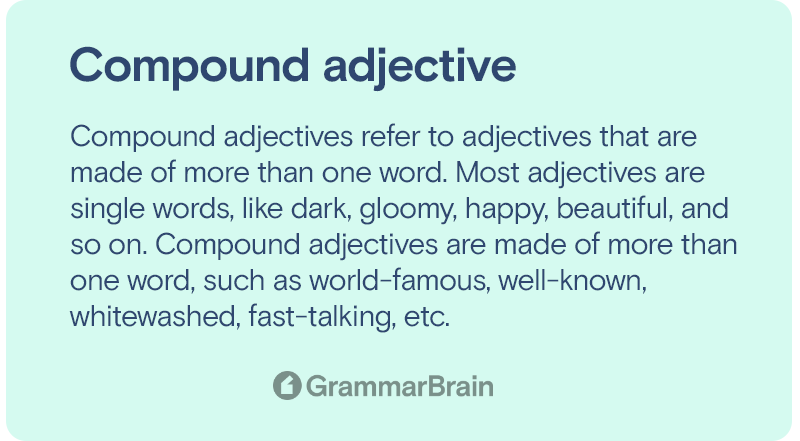
What are compound adjectives?
Compound adjectives are adjectives that constitute more than one word. It includes both hyphenated and non-hyphenated words. Examples of non-hyphenated compound adjectives are homegrown, seasick, and bulletproof.
There are plenty of examples of hyphenated compound adjectives, such as well-known, world-famous, user-friendly, and absent-minded.
Definition
A compound adjective is an adjective created when a noun, participle, or adjective is added to another adjective.
In most cases, hyphens are used to separate the words in a compound adjective. This is a safe way to identify compound adjectives in a sentence.
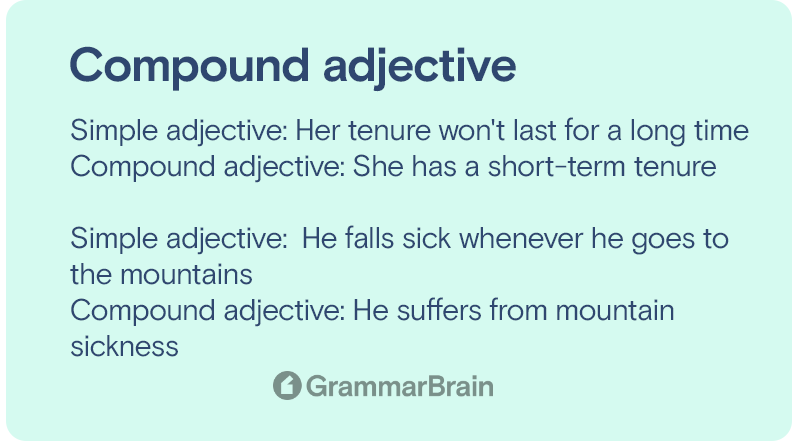
When to use compound adjectives
Compound adjectives are used when simple adjectives aren’t suitable enough to convey the complete meaning of a sentence. For example, instead of writing:
He is known around the world
We can write:
He is world-famous
As can be seen from the above example, using a compound adjective makes the sentence more concise and succinct. Using compound adjectives can help improve writing and speaking abilities while maintaining coherence in sentence structures.
Let’s check out some more examples of using compound adjectives in sentences:
- Simple adjective: Her tenure won’t last for a long time
- Compound adjective: She has a short-term tenure
- Simple adjective: He falls sick whenever he goes to the mountains
- Compound adjective: He suffers from mountain sickness
- Simple adjective: John is never focused on the moment
- Compound adjective: John is always absent-minded
- Simple adjective: This is the best product you can get right now
- Compound adjective: This is a best-in-class product
- Simple adjective: The entire village speaks Spanish
- Compound adjective: It’s a Spanish-speaking village
- Simple adjective: Rich Dad, Poor Dad opened my eyes
- Compound adjective: Rich Dad, Poor Dad is an eye-opening book
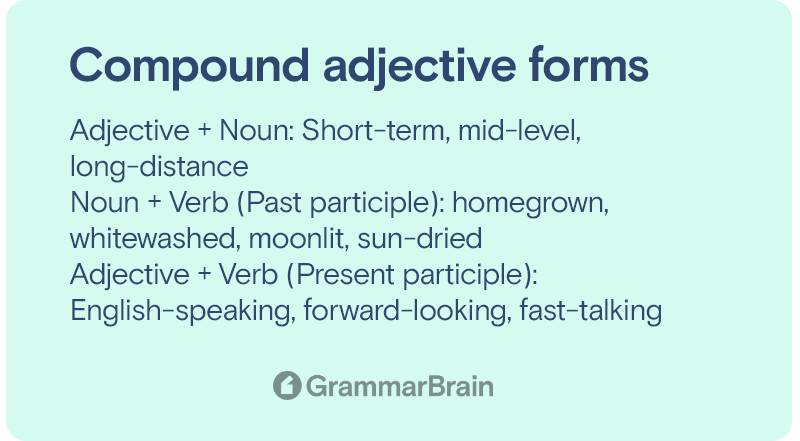
Different types of compound adjectives
There are multiple types of compound adjectives. For example, some compound adjectives follow a Noun + Adjective structure, while others follow an Adjective + Noun structure. Compound adjectives also incorporate different tenses of verbs.
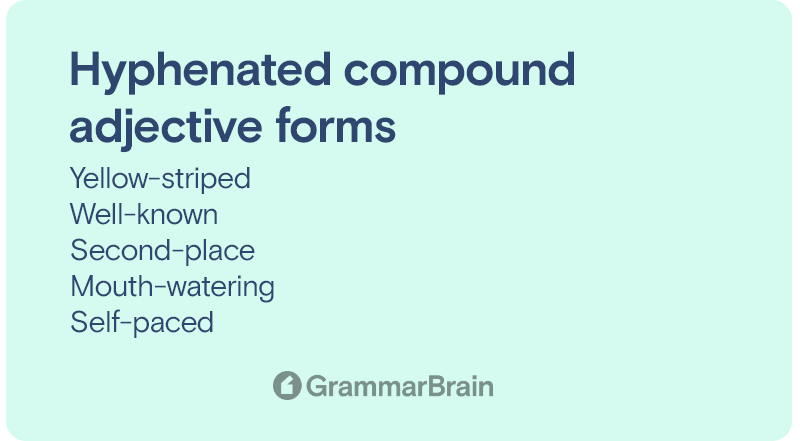
Let’s check out examples for a clearer understanding.
Adjective + Noun: Short-term, mid-level, long-distance
Examples:
- I am doing a short-term project
- He is working as a mid-level manager
- She went on a long-distance trek
Noun + Verb (Past participle): homegrown, whitewashed, moonlit, sun-dried
Examples:
- I prefer using homegrown herbs in my dishes
- Australia whitewashed England in the latest cricket series
- It was a clear, moonlit night
- These are sun-dried figs that you can eat
Adjective + Verb (Present participle): English-speaking, forward-looking, fast-talking
Examples:
- The United States of America is primarily an English-speaking country
- My manager has a forward-looking approach to business
- His fast-talking personality did not impress the interviewers
Noun + adjective: red-hot, cruelty-free, sky-blue
Examples:
- Continuous impact made the iron rod red-hot
- I only believe in using cruelty-free skincare products
- She wanted a sky-blue dress for the evening
Noun + noun: meat-eater, mountain sickness, waterproof, bulletproof
Examples:
- David is a vigorous meat-eater
- He suffers from mountain sickness very often
- James Bond drives a bulletproof car and wears a waterproof watch
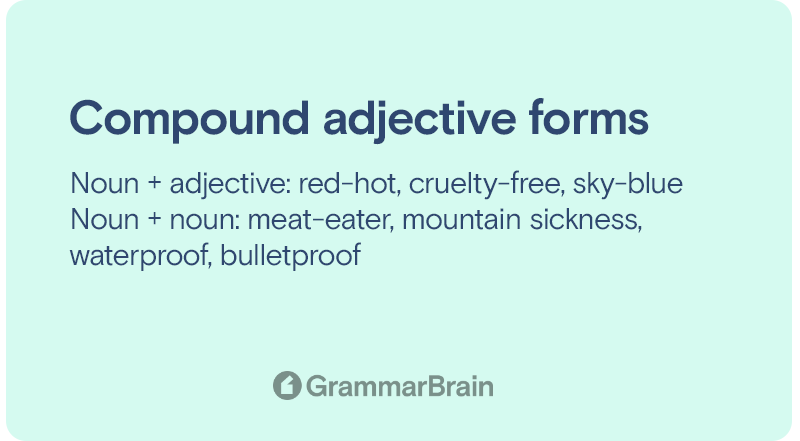
Hyphenated and non-hyphenated compound adjectives
Compound adjectives are generally hyphenated, but it’s not always the case. The same goes for the number of words in a compound adjective. Many compound adjectives are treated as a single word. Here are some examples:
- Seasick
- Bulletproof
- Undercooked
- Overpopulated
- Underachiever
- Overconfident
- Doghouse
- Catcall
These words don’t have hyphens and are used in sentences as a single word. However, many compound adjectives are hyphenated. Here are some examples of common hyphenated compound adjectives:
- Yellow-striped
- Well-known
- Second-place
- Mouth-watering
- Self-paced
- Warm-blooded
- Second-rate
- High-stress
- Fat-free
Several compound adjectives contain more than two words. Here are some examples:
- One-of-a-kind
- Never-before-seen
- Out-of-the-way
- Top-of-the-line
- Best-in-class
- Holier than thou
- Happy-go-lucky
- Under-the-table
Compound adjectives can have one word, two words, or more than two words. Creative writers often combine more than two or three words to create unique compound adjectives.
Where to put the hyphen
In some cases, using a hyphen is not necessary to make compound adjectives.
Read this sentence –
- Mary has a big beautiful doll.
In the sentence above, the term “big beautiful” is the compound adjective as it describes the noun “doll”. But hyphen has not been used.
This is because you can also add the word “and” to express the same view. For example –
- Mary has a big and beautiful doll
So, in cases where “and” can be put to describe the same thing, hyphen is not necessary to make compound adjectives.
Now read this sentence –
- He was once a world-beloved musician.
Can you also write the sentence like this? –
- He was once a world and beloved musician.
In the first sentence, “world-beloved,” tells you that the subject was loved by people all over the world. But in the second sentence, “world and beloved” means that the subject was the world and loved. That doesn’t make much sense. So, a hyphen is important in this case.
Compound adjectives starting with adverbs
Compound adjectives frequently start with adverbs. In such cases, the compound adjective is not hyphenated. They may not even read like a single expression or word, as we can see in the following examples:
- He wore a neatly pressed shirt
- Digital marketing is a rapidly growing sector
- After the disagreement, he was coldly treated by his friend
- The marathon made me dreadfully tired
Hyphens are never used in compound adjectives that begin with an adverb. This is because the two words (adverb + adjective) work together as a compound adjective.
Various types of compound adjectives (examples)
There are many possible combinations of words that form compound adjectives. Here are some of the primary compound adjective types –
- Noun + Adjective
- Number + Noun
- Adjective + Noun
- Word + Past Participle
- Word + Present Participle
- Italics
- Title Case (Example – Coldplay concert tickets)
- Quotation marks (Example – “Web-slinging” Spider-Man)
Examples of compound adjectives with adjectives
Here are some examples of adjective + adjective compounds –
- Sugar-free – This ice cream is entirely sugar-free.
- Super-fast – Henry caught the ball super-fast.
- Stone-cold – She was upset by his stone-cold response
- World-beloved – At that time, he did not realize Mark was a world-beloved pianist.
- Fiery-hot – Don’t touch the bar! It is fiery-red.
Examples of compound adjectives ending with nouns
Here are some examples of adjective + noun compounds –
- Blue-eye – He seems unbothered due to his blue-eye thinking.
- Banana-pie – I have kept your cookies in the banana-pie tin.
- Long-distance – Use this phone for long-distance calls.
- First-time – This was his first-time encounter.
- Short-term – A short-term memory is as important as the long-term one.
Examples of compound adjectives starting with numbers
Here are some examples of number + adjective compounds –
- 2-wheel – She is more comfortable riding a 2-wheel vehicle.
- 3-month– Don’t call him, he’s on a 3-month break.
- 15-second – I eat dropped food immediately, according to my 15-second rule.
- 1000-line – This is a 1000-line poem.
- Third-place – Third-place entries are to be seated at the back.
Examples of compound adjectives ending with present participles
Here are some examples of adjective + present participles compounds –
- Short-lasting – Doubt is the key to a short-lasting relationship.
- Germa-speaking – The United States of America is not a German-speaking country.
- Self-defeating – Coping with depression using drugs is self-defeating.
- Backward-thinking – He was mocked by his peers for his forward-thinking approach.
- Thought-provoking – The thought-provoking debate made many people question their own opinions.
Examples of compound adjectives ending with past participles
Here are some examples of adjective + past participle compounds –
- Long-haired – His parents were not very accepting of his long-haired look.
- Broad-minded – Your broad-minded thinking will help you grow.
- Undercooked – Pay attention to the time. The food should not remain undercooked.
Examples of compound adjectives describing a person
Here are some examples of compound adjectives that describe a person –
- Hot-headed
- Near-sighted
- Bright-eyed
- Stone-hearted
- Dumb-founded
Examples of compound adjectives with quotation marks and italics
Some compound adjectives are expressed using quotations and italics. Here are some examples –
Italics
- Pro bono (meaning: without charge) – Here’s your bill and this is pro bono.
- Ab initio (meaning: for beginners) – What you are playing is ab initio.
Quotation marks
- “How dare you” – When he rejected her proposal she had a “how dare you” look on her face.
Watching out for ambiguous adverbs
Some adverb + adjective compounds are combined using a hyphen. This happens when the word is an ambiguous adverb.
An ambiguous adverb, like “fast” and “well”, can work both as an adjective and an adverb depending on their use in a sentence.
Some examples include –
- Well-fitting clothes
- Fast-eating goat
Importance of compound adjectives
Compound adjectives are powerful linguistic tools for English speakers and writers. Simple adjectives are often insufficient in conveying a sentence’s accurate meaning or expression. Compound adjectives also help us construct more concise statements that get the message across with ease.
Compound adjective word list
- World-Famous
- Well-Known
- Well-Educated
- Well-Behaved
- Well-Behaved
- Well Looked-After
- Time-Saving
- Sparsely-Populated
- Sought-After
- Small-Minded
- Short-Tempered
- Red-Colored
- Part-Time
- Open-Minded
- Mouth-Watering
- Middle-Aged
- Long-Lasting
- Long-Haired
- Hot-Headed
- Hard-Working
- Good-Looking
- Full-Length
- Five-Minute
- Five-Foot
- Fat-Free
- Fast-Moving
- English-Speaking
- Dimly-Lit
- Closed-Minded
- Brown-Eyed
- Blonde-Haired
FAQs
What are compound adjectives?
Compound adjectives are two or more words that act together as an adjective. In simple words, compound adjectives are compound words acting as adjectives. A compound adjective is formed when two or more adjectives work together to modify the same noun. It’s important to understand how compound nouns and proper nouns work (and what they are).
What are some examples of compound adjectives?
Examples of compound adjectives are:
- Fast-paced
- Well-rounded
- Overpopulated
- Over-the-top
- State-of-the-art
- Neatly done
When are compound adjectives used?
Compound adjectives are used in sentences and expressions where simple adjectives fail to convey the whole meaning that the speaker/writer wants to express.
Are compound adjectives always hyphenated?
No, compound adjectives can be both hyphenated and non-hyphenated. However, most compound adjectives are adjectives, except compound adjectives that begin with adverbs.
What are some examples of hyphenated compound verbs?
Fast-paced, well-rounded, state-of-the-art, self-paced, well-known, and world-famous.
What are some examples of non-hyphenated compound verbs?
Overpopulated, underachiever, bulletproof, overstated, undercooked.
Can compound adjectives have more than two words?
Yes, compound adjectives can have more than two words. Examples of such compound adjectives include state-of-the-art, under-the-table, over-the-top, and holier than thou.
What are some examples of compound adjectives that begin with adverbs?
Nicely done, warmly welcomed, rapidly growing, extremely beautiful, widely known, and very brave.
Do you hyphenate compound adjectives?
The tendency to hyphenate all compound adjectives is different from compound nouns. Since many of them are hyphenated. It’s required to hyphenate compound adjectives because without the hyphenation, the modifier wouldn’t make sense.
Sources:
- What Is A Compound Adjective? | Thesaurus.com
- What Is a Compound Adjective? Definition & Examples (gingersoftware.com)
- Compound Adjectives in English – Espresso English
- Examples of Adjectives – Using Adjectives in a Sentence (gingersoftware.com)
- Examples of Compound Adjectives (grammar-monster.com)
Inside this article
Fact checked:
Content is rigorously reviewed by a team of qualified and experienced fact checkers. Fact checkers review articles for factual accuracy, relevance, and timeliness. Learn more.
Core lessons
Glossary
- Abstract Noun
- Accusative Case
- Anecdote
- Antonym
- Active Sentence
- Adverb
- Adjective
- Allegory
- Alliteration
- Adjective Clause
- Adjective Phrase
- Ampersand
- Anastrophe
- Adverbial Clause
- Appositive Phrase
- Clause
- Compound Adjective
- Complex Sentence
- Compound Words
- Compound Predicate
- Common Noun
- Comparative Adjective
- Comparative and Superlative
- Compound Noun
- Compound Subject
- Compound Sentence
- Copular Verb
- Collective Noun
- Colloquialism
- Conciseness
- Consonance
- Conditional
- Concrete Noun
- Conjunction
- Conjugation
- Conditional Sentence
- Comma Splice
- Correlative Conjunction
- Coordinating Conjunction
- Coordinate Adjective
- Cumulative Adjective
- Dative Case
- Determiner
- Declarative Sentence
- Declarative Statement
- Direct Object Pronoun
- Direct Object
- Diction
- Diphthong
- Dangling Modifier
- Demonstrative Pronoun
- Demonstrative Adjective
- Direct Characterization
- Definite Article
- Doublespeak
- False Dilemma Fallacy
- Future Perfect Progressive
- Future Simple
- Future Perfect Continuous
- Future Perfect
- First Conditional
- Irregular Adjective
- Irregular Verb
- Imperative Sentence
- Indefinite Article
- Intransitive Verb
- Introductory Phrase
- Indefinite Pronoun
- Indirect Characterization
- Interrogative Sentence
- Intensive Pronoun
- Inanimate Object
- Indefinite Tense
- Infinitive Phrase
- Interjection
- Intensifier
- Infinitive
- Indicative Mood
- Participle
- Parallelism
- Prepositional Phrase
- Past Simple Tense
- Past Continuous Tense
- Past Perfect Tense
- Past Progressive Tense
- Present Simple Tense
- Present Perfect Tense
- Personal Pronoun
- Personification
- Persuasive Writing
- Parallel Structure
- Phrasal Verb
- Predicate Adjective
- Predicate Nominative
- Phonetic Language
- Plural Noun
- Punctuation
- Punctuation Marks
- Preposition
- Preposition of Place
- Parts of Speech
- Possessive Adjective
- Possessive Determiner
- Possessive Case
- Possessive Noun
- Proper Adjective
- Proper Noun
- Present Participle
- Prefix
- Predicate



